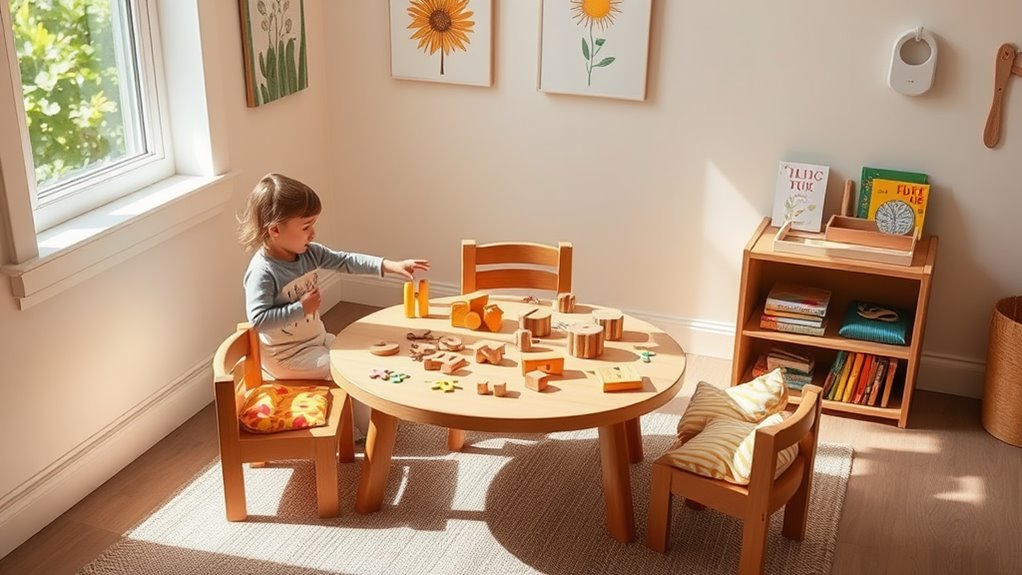The Benefits of Montessori Parenting for Child Development
When you explore Montessori parenting, you might find it offers a unique framework for fostering your child’s development. This approach emphasizes independence and encourages critical thinking while nurturing emotional intelligence. By creating an environment where children can learn at their own pace, you’re not just supporting their individual interests but also equipping them with essential life skills. As you consider the implications of this method, you may wonder how these practices can shape your child’s future and the lasting impact they can have on their growth.
Understanding Montessori Principles
Montessori principles focus on fostering a child’s natural desire to learn, creating an engaging environment where they can explore at their own pace. This approach emphasizes hands-on learning, allowing children to interact with materials that spark their curiosity.
In a Montessori setting, you’ll see a variety of learning tools designed to cater to different interests and developmental stages, encouraging your child to choose what to explore next.
Another key principle is respect for the child. This means you recognize their individual needs and interests, supporting their unique learning journey. By allowing children to make choices, you empower them, cultivating a sense of ownership over their education.
The learning environment is often arranged to be aesthetically pleasing and organized, which helps children focus better and feel more comfortable.
Montessori also values collaboration, as children often work in groups or pairs. This social aspect builds communication skills and fosters friendships, making learning a shared experience.
Overall, understanding these principles can transform your approach to parenting, leading to a more enriching and supportive atmosphere for your child’s development.
Fostering Independence in Children
Creating an engaging environment not only sparks curiosity but also encourages children to develop independence. In a Montessori setting, you’ll notice how children are given choices in their activities, which fosters a sense of responsibility. When you allow your child to pick what they want to work on, they learn to trust their instincts and make decisions.
Encouraging independence doesn’t mean stepping back completely. Instead, you can offer guidance while giving them space to explore. For example, when they struggle with a task, resist the urge to jump in immediately. Instead, ask questions that help them think through the problem on their own. This builds confidence in their abilities.
You can also create opportunities for your child to take on age-appropriate responsibilities at home, like setting the table or tidying their room. These small tasks empower them, making them feel capable and valued.
Enhancing Critical Thinking Skills
Nurturing critical thinking skills in children is essential for their development and future success. Montessori parenting encourages this by allowing your child to explore, question, and create their own understandings of the world. Instead of simply providing answers, you can guide them through thought-provoking questions that spark their curiosity. This approach helps them learn to analyze situations, weigh options, and come to their own conclusions.
In a Montessori environment, children are presented with hands-on materials that challenge them to think critically. For example, when they engage with puzzles or scientific experiments, they learn to observe, hypothesize, and test their ideas. You can support this by encouraging them to discuss their thought processes, asking, “What do you think will happen if…?” or “Why do you believe that?”
Moreover, fostering a culture of exploration at home, where mistakes are seen as learning opportunities, can further enhance their critical thinking abilities. When you celebrate their efforts and encourage them to ask “why” or “how,” you help them build confidence in their reasoning skills.
This foundation won’t only benefit them academically but also prepare them for real-world problem-solving as they grow.
Promoting Emotional Intelligence
Emotional intelligence is an essential skill that can greatly impact a child’s ability to navigate relationships and manage their feelings. In a Montessori environment, you can foster this critical ability by encouraging your child to express emotions openly. When you validate their feelings, whether they’re happy, sad, or frustrated, you’re helping them understand their emotional landscape.
You can also promote empathy by guiding your child to recognize and respect the feelings of others. Engaging in role-play or reading stories together can spark conversations about different perspectives, allowing them to practice empathy in a safe space.
Encourage problem-solving by letting your child work through conflicts independently, providing support when necessary. This way, they’ll learn to identify emotions, articulate them, and seek solutions.
Additionally, creating a calm environment where your child feels safe to explore their emotions can make a significant difference. By integrating these practices into your daily routine, you’re not just promoting emotional intelligence; you’re also equipping your child with the tools they need to face future challenges.
Encouraging Collaborative Learning
In a Montessori setting, collaboration becomes a natural part of learning, allowing children to thrive together. You’ll notice how kids work side by side, sharing ideas, resources, and knowledge. This teamwork encourages them to develop essential social skills like communication and empathy, which are crucial for their future interactions.
When children collaborate, they engage in problem-solving activities that spark creativity and critical thinking. Instead of competing against each other, they learn to support one another, celebrating each other’s successes. You’ll see them brainstorming together, discussing different viewpoints, and even teaching one another. This mutual exchange not only boosts confidence but also fosters a sense of community.
Furthermore, collaborative learning helps children understand the value of diverse perspectives. They learn that everyone has unique strengths and contributions, which enriches their understanding of the world around them.
Supporting Individual Learning Styles
Throughout early childhood, recognizing and supporting individual learning styles is essential for fostering a child’s unique abilities. Every child learns differently, and as a parent, you can play a crucial role in this process. By observing your child’s interests and strengths, you can tailor their learning experiences to suit their needs.
For example, some children may thrive through hands-on activities, while others might prefer reading or visual aids. By providing a variety of materials and methods, like art supplies, books, or games, you can encourage exploration and discovery.
It’s also important to create an environment where your child feels safe to express themselves. Encourage them to ask questions and pursue topics that excite them. This approach not only boosts their confidence but also deepens their understanding of the material.
Building Resilience Through Challenges
Building resilience is crucial for children’s development, and facing challenges plays a significant role in this process. In a Montessori environment, kids encounter situations that encourage them to solve problems independently. When you let your child tackle age-appropriate challenges, they learn to navigate difficulties without relying solely on you for answers. This not only boosts their confidence but also teaches them that effort can lead to success.
As your child faces obstacles, they develop coping strategies. For instance, if they struggle with a puzzle, you can encourage them to try different approaches rather than stepping in to help immediately. This approach fosters a sense of ownership over their learning. It’s essential to celebrate their efforts, even if they don’t achieve the desired outcome right away.
You’ll notice that as your child learns to deal with setbacks, they become more adaptable. This adaptability helps them in various situations, from social interactions to academic challenges.
Long-term Benefits for Development
The long-term benefits of Montessori parenting greatly shape a child’s development. When you embrace this approach, you’re not just focusing on today; you’re laying a foundation for your child’s future. Montessori methods encourage independence, critical thinking, and a love for learning. These skills are fundamental as your child grows and faces new challenges in life.
As they explore their interests and take ownership of their education, your child develops confidence and self-motivation. They learn to set goals and work towards them, which builds perseverance. These traits are vital in academic settings and later in the workplace.
Additionally, Montessori parenting fosters strong social skills. By interacting with peers of varying ages in a collaborative environment, your child learns empathy, communication, and teamwork. These skills help them navigate relationships throughout life.
Moreover, the emphasis on intrinsic motivation means your child is likely to continue pursuing knowledge and personal growth long after they leave the classroom. They’re not just learning facts; they’re developing a mindset that values curiosity and resilience.




